Autistics and ADHDers all around the world can rejoice because the live-action "Little Mermaid" is finally streaming on Disney+, meaning we can rewatch it a million times and analyze it frame by frame till everyone around us gets sick of us. If you're one of those people who had an issue with Ariel being portrayed by a Black woman, you're most probably not going to like where this is going, so this is your warning: even more representation of marginalized groups lies ahead.
It's late May 2023, and I'm sandwiched between my teenage brother and my little sister at our local cinema waiting for the live-action "Little Mermaid" to start playing. I had already grown up watching the original animated version and despite enjoying it, had already hammered into my brain that it was not feminist. This experience was not going to do anything for me. I was so wrong. I went in hoping my darker-skinned 7-year-old sister could finally see that she doesn't have to be white to feel like a princess. I never would've expected 21-year-old me to be the one who would leave feeling seen.
"Are you OK?" my brother asked, confusing my erratic movement for anxiety-induced shaking. Ariel's character (Halle Bailey) had just been introduced and I was already bouncing (literally) in my seat, flapping my hands and suppressing happy squeals.
"She's autistic!"
"Nahhhh, she's not."
He couldn't see it. That's fine. My pattern recognition, special interest in neurodiversity and I were going to prove it. Thus began two hours of me fervently typing into the notes app on my phone with the brightness lowered to the minimum. No one else was going to see it, it was for my own enjoyment, but if you're reading this article right now, that was the second time that evening that a Disney movie proved me wrong.
The A in Ariel stands for autistic
Now, is Ariel canonically autistic? I guess not, but you can either choose to believe she's an allistic woman who chose to give up everything and uproot a life as a literal princess for a man she didn't even know or read between the lines (aren't allistics supposed to be good at that?) and view the movie as an allegory for neurodivergence. I personally would like to believe that Ariel wasn't just obsessed with Eric for no reason. Sure, there may be romantic attraction there, but, it is undeniable that he is also an extension of her special interest: the human world.
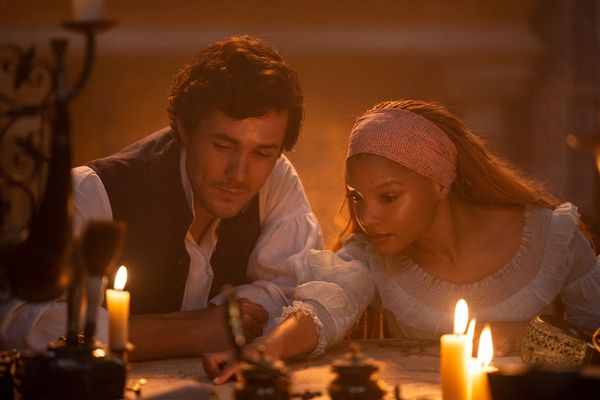 Jonah Hauer-King as Prince Eric and Halle Bailey as Ariel in Disney's live-action "The Little Mermaid" (Photo courtesy of Disney/Giles Keyte)A special interest is an intense interest that autistic people form, not to be mistaken for a mere hobby. Special interests can be so intense that they are all the autistic person may want to do or talk about. Talk to any autistic person with a special interest in some fantasy world from a piece of media and you'll learn that not only will they collect any form of merchandise (or thingamabobs, if you will), often lose track of time, preferring to spend it learning more about said special interest over socializing or most anything else (such as an annual meeting to prepare for the upcoming Coral Moon festivities), but would also be willing to trade their lives in a world where they feel out of place, to be a part of this fantasy world, in a heartbeat. I never understood why the song "Part of Your World," would always make me so emotional as a child, but now that I see it as the autistic anthem for wanting to exist in a world where you fit in, I finally do.
Jonah Hauer-King as Prince Eric and Halle Bailey as Ariel in Disney's live-action "The Little Mermaid" (Photo courtesy of Disney/Giles Keyte)A special interest is an intense interest that autistic people form, not to be mistaken for a mere hobby. Special interests can be so intense that they are all the autistic person may want to do or talk about. Talk to any autistic person with a special interest in some fantasy world from a piece of media and you'll learn that not only will they collect any form of merchandise (or thingamabobs, if you will), often lose track of time, preferring to spend it learning more about said special interest over socializing or most anything else (such as an annual meeting to prepare for the upcoming Coral Moon festivities), but would also be willing to trade their lives in a world where they feel out of place, to be a part of this fantasy world, in a heartbeat. I never understood why the song "Part of Your World," would always make me so emotional as a child, but now that I see it as the autistic anthem for wanting to exist in a world where you fit in, I finally do.
The infamous fork or dinglehopper scene can be seen as a metaphor for how autists need to teach themselves how to follow social cues by watching allistics.
Looking back, as an undiagnosed auDHDer (someone who is autistic and has ADHD) who had no idea what autism even was at the time, what instantly drew me to the original animated Ariel despite wrongfully thinking she was anti-feminist, was her innate curiosity. The live-action version only doubled down on this. Ariel questions everything, including the things that other merfolk around her have just accepted as indisputable facts, such as why the merpeople assume all humans are the same. She doesn't follow rules that don't make sense to her just because they are coming from an authority figure; if she wants to visit an abandoned shipwreck site, it doesn't matter that her father, the king, forbids it, she's going to go. Of course, all of this is misinterpreted by others around her as her purposefully being obtuse and making trouble: if that isn't a universal autistic experience, I don't know what is.
One of the biggest social struggles autistic people face is understanding and/or following social cues. The infamous fork or dinglehopper scene can be seen as a metaphor for how autists need to teach themselves how to follow social cues by watching allistics around us for whom said social cues come naturally. It's important to note that when Ariel learns to use the fork for eating, she is simply copying what she's seeing, she doesn't know nor understand why it's used like that, just as when highly masked autistic people follow social cues simply to fit in, despite not actually understanding them.
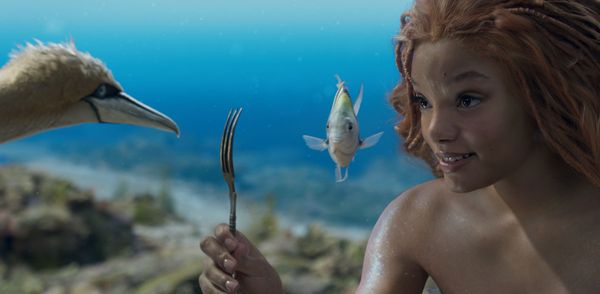 Scuttle (voiced by Awkwafina), Flounder (voiced by Jacob Tremblay), and Halle Bailey as Ariel in Disney's live-action "The Little Mermaid" (Photo courtesy of Disney)
Scuttle (voiced by Awkwafina), Flounder (voiced by Jacob Tremblay), and Halle Bailey as Ariel in Disney's live-action "The Little Mermaid" (Photo courtesy of Disney)
There are of course more literal examples of Ariel's lack of understanding of social cues. For example, when speaking to Ursula, Ariel is very open about how her father has already told her that Ursula likes to "stir trouble," and calls her a Sea Witch, to her face, to which Ursula takes offense. It's almost as if Ariel says the words "Sea Witch," as a mere fact, rather than as an insult that requires looking into some hidden implication behind the words. Ariel also doesn't anticipate others having hidden motives since she herself is straightforward and says exactly what she means, so when Ursula offers her help, help is what Ariel expects, nothing else. This often gets autistic people labeled as naive and gullible and leaves us vulnerable to manipulation and mate crime – when a supposed friend deliberately takes advantage of you or makes you feel bad.
Even the smallest of details point towards Ariel being autistic, such as her toe-walking and her discomfort in human clothes, a struggle that resonates with autistic people all around the world. Our sensory issues and trouble with temperature regulation make it difficult for us to wear things that most people wouldn't think twice about. Ariel's refusal to wear a corset despite it being a social faux pas to be seen without one at the time is very similar to autistic women and AFAB's discomfort with wearing bras.
Neurodivergent relationships
Ariel being autistic would also explain her dynamic with other characters throughout the movie. Autistic people can often feel closer to pets than to other humans. We also often find ourselves forming friendships with other neurodivergent people exclusively. Either of these could be an explanation for why Ariel's only friends are Flounder and Scuttle instead of other merpeople. Supremely, the presence of neurodivergence in the live-action film got me to do something the original animated film never could: ship Ariel and Eric.
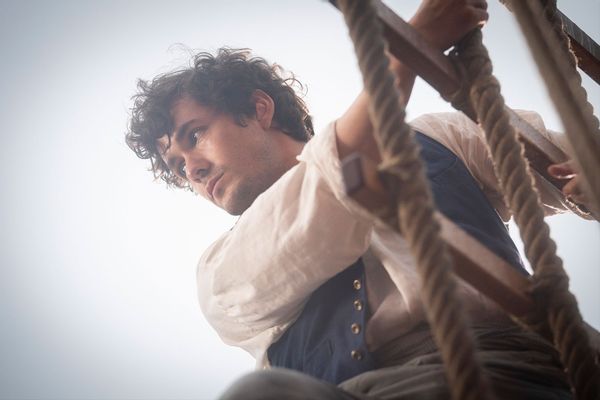 Jonah Hauer-King as Prince Eric in Disney's live-action "The Little Mermaid" (Photo courtesy of Disney/Giles Keyte)
Jonah Hauer-King as Prince Eric in Disney's live-action "The Little Mermaid" (Photo courtesy of Disney/Giles Keyte)
Ariel helps Eric unmask.
Ariel initially feels drawn to Eric simply from observing him exist. Within a few minutes, she sees his compassion for Max and relates to his feeling of being an outsider, unable to live up to the expectations put on him, thus bonding over their neurodivergence without ever even having to interact. Once the two do begin to interact, the chemistry between the two is palpable and quite frankly, simply makes sense, especially if you view it as a relationship between an autistic person and a person with ADHD.
If Eric's constant dopamine seeking, inability to sit still and ever-present need for adventure and newness hadn't already convinced me that he is a fellow ADHDer, the progression of his relationship with Ariel definitely would have. Eric being so determined to find the girl who saved him from drowning but then forgetting all about her and being completely infatuated with Ariel when she's "rescued," is every ADHDer jumping from hyperfixation to hyperfixation, ever. He is also proven to be extremely impulsive, such as when he takes Ariel on a carriage ride to the lagoon despite not being fully healed and the Queen forbidding it.
Ariel helps Eric unmask. They can be their authentic selves around each other and no one else, info-dumping (a neurodivergent love language) on each other to their hearts' content. He literally info-dumps the whole time on his date with Ariel at the lagoon, which neither of their neurodivergent selves is able to realize is a date. He truly is the hyperverbal boyfriend to Ariel's non-verbal girlfriend. The scenes depicting the romance between the two when Ariel is unable to speak also help remind the audience that just because someone is non-verbal or experiencing a verbal shutdown, doesn't mean they are incapable of communication or should be infantilized. Ariel and Eric find creative ways to communicate despite her lack of voice and prove that it is possible to have meaningful relationships even when there is a communication barrier. Plus they gave me the first ever scene in a movie where a guy is pointing out constellations to a girl that didn't make me cringe. In fact, the way Ariel uses the constellation Aries to tell Eric her name is one of my favorite scenes between the two in the whole movie.
Speaking of the infamous lagoon date, the updated lyrics to "Kiss the Girl," asking for explicit consent becomes especially relevant in the context of neurodivergence since neurodivergent people, especially autistic people, are often unable to pick up on non-verbal cues and end up getting taken advantage of at a much higher rate than neurotypical people. So if you're planning on kissing an autistic girl, it really is best to just straight-up ask her.
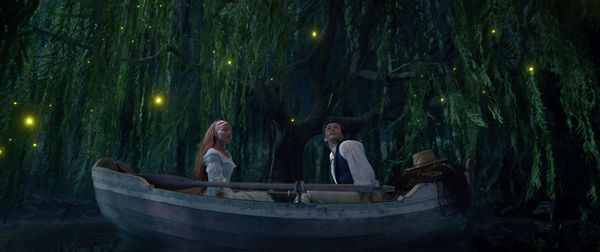 Halle Bailey as Ariel and Jonah Hauer-King as Prince Eric in Disney's live-action "The Little Mermaid" (Photo courtesy of Disney)
Halle Bailey as Ariel and Jonah Hauer-King as Prince Eric in Disney's live-action "The Little Mermaid" (Photo courtesy of Disney)
If you're planning on kissing an autistic girl, it really is best to just straight-up ask her.
As Sebastian points out, "when it comes to romance these two are slow as snails." This is often the case for neurodivergent people. Our friends and even outsiders often see possible romance in our lives before we do ourselves. Both Ariel and Eric are more interested in discovering the world around them than pursuing a romantic relationship, which ironically is what draws them together.
Growing up, I was never able to sympathize with Ariel being upset over losing Eric to another girl. Now that I've lived life and been in and out of relationships as an autistic person, I completely understand. A breakup when you're autistic is so much more than just that. You're not just losing your partner, you're losing the safe space you made with them, which is often the only place you get to unmask and truly be yourself. You're also losing a person who is probably your special interest by now too, so losing them feels like losing your home, your purpose and even parts of yourself that only come out when they're around. It can be much more painful than any normal breakup especially because many autistic people feel emotions much more intensely than allistic people. Our black-and-white thinking also plays a role in making breakups so intense because they quite literally feel like the end of the world. So when Ariel sings "Where do I go with nowhere to turn to?" I fully understand and relate.
Bet'cha on land they understand. Bet they don't reprimand their daughters
The fact that Eric's mother preferred him when he was under a literal curse is a reflection of the reality of most neurodivergent people's experiences. People, even those who claim to be closest to us, often prefer us to mask the majority of our neurodivergent traits around them. This is exemplified when we look at King Triton's continuous treatment of Ariel throughout the course of the movie. He others her, infantilizes her and punishes her simply for being herself. The whole time, he was perfectly capable of turning her human and letting her pursue the life she wanted, and his refusal to do so is what pushed Ariel towards Ursula. This serves as a cautionary tale for the parents of neurodivergent children; do not try to change your children or punish them simply for being different, this only further isolates them from you and makes them more vulnerable to being taken advantage of by others.
Want a daily wrap-up of all the news and commentary Salon has to offer? Subscribe to our morning newsletter, Crash Course.
The ending of the movie feels like it was tailor-made to be a wish fulfillment for neurodivergent people. King Triton accepts Ariel as she is instead of trying to change or fix her because he finally realizes how painful that was for her. The Queen, Eric's mother, accepts that she was wrong and his feelings are valid and real all along and sends him off to explore the world with Ariel by his side. Ariel thanks her father for hearing her, and he replies that she shouldn't have had to give up her voice to be heard and that he is here for her. This is the ending every neurodivergent person dreams of; to be seen and heard without having to minimize or sacrifice parts of ourselves or mask for others' convenience; for the people in our lives to finally understand us and still stay.
Read more
about this topic
- The Daniels on the ADHD theory of "Everything Everywhere All at Once," paper cuts and butts
- How autistic comedian Fern Brady made it in the comedy world
- "Everything's Gonna Be Okay" lays its sweet, cheeky charm on a world in need of comfort
- You're a genius, you just don't know it: Temple Grandin on how "visual thinkers" see the world


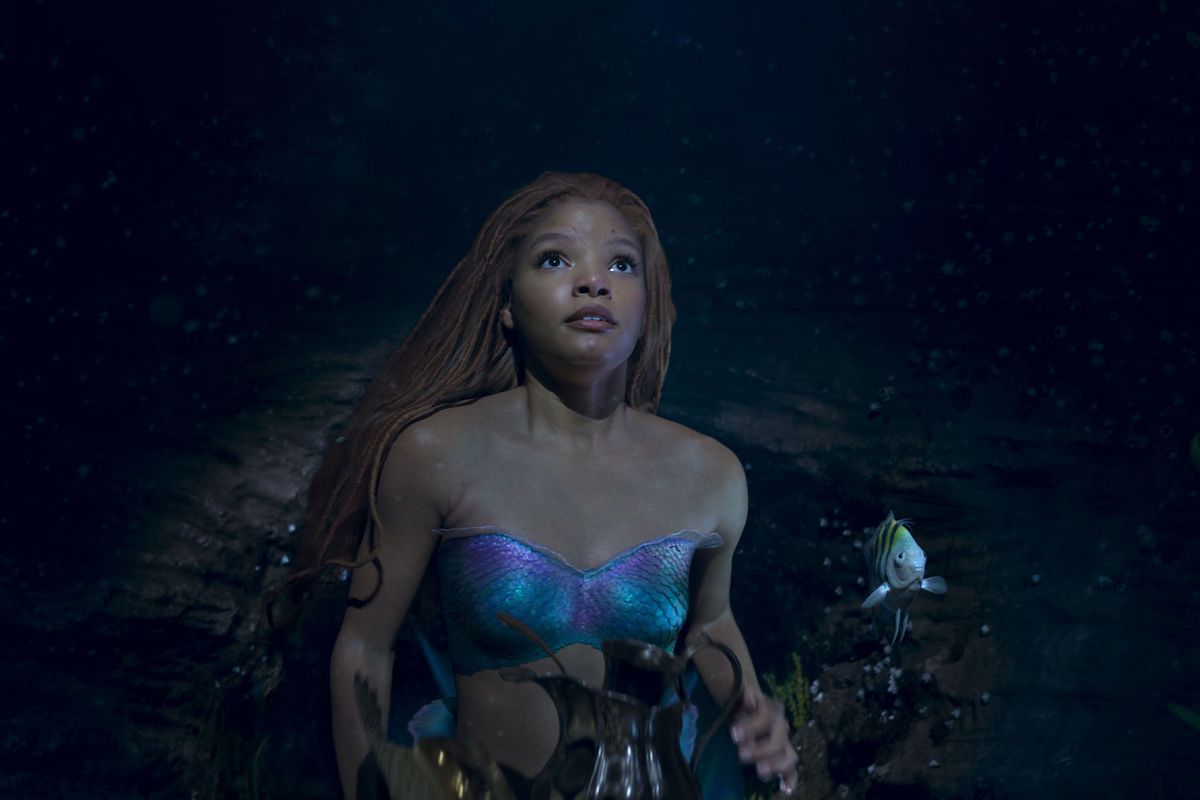
Shares